If you’ve got pain, He’s a pain taker.
If you feel lost, He’s a way maker.
If you need freedom or saving,
He’s a prison-shaking Savior.
If you got chains,
He’s a chain breaker.
—Zach Williams, Lyrics
____________________________
We all saw it coming, whether we wanted to or not. I mentioned it at the end of my blog a few months ago. We never made much fuss, because there wasn’t much fuss to make. It was all closing in, there in early February. My oldest brother, Joseph, was approaching the end of the road.
I knew, when I went out to see him. Back when I mentioned it on the blog. He had been accepted into some sort of experimental program, there at Ohio State. The James. But I knew. Joseph was very ill. Had been, for over ten years. He fought hard, to beat or at least to slow down the deadly blood disease that coursed through his veins. Multiple myeloma. That’s what the doctors called it. I had never heard of it before. He fought hard, my brother did, but there was only one way it could end. Early on Friday morning, March 22, the death angel came knocking on the door. It was a mission of mercy for a wasted body wracked with pain. This time, the angel would strike. This time, Joseph could not refuse. This time, it was his time. He was seventy-one years old.
4:30 AM, that morning. My cell phone buzzed. And buzzed some more. It took a moment to stumble out of bed and answer. I saw it was my brother Stephen calling. And I knew exactly what he wanted to tell me that early in the day. I answered. Stephen spoke my name. Yes? “Joseph died this morning at four o’clock,” he told me. I thanked him and we hung up. I snuggled back into the warm bed, but there would be no more sleep that morning. I got up and sat at my computer and stared at the screen. And then I wrote the words that came to my mind at that moment in time, about that moment in time.
The clans would gather, of course. As usual, in a time like this. Except, there never had been time like this before. Not in our family’s history. Now the first of my siblings had moved on over to the other side. We would never see him again until we went to where he was. He could never see us in this world again. It was a heavy thing to grasp, even though we had been anticipating this very moment for some time. And I figured to pack up and load my Jeep the next day and head west and south.
There are a few things I want to say about my oldest brother. Joseph. The good son, the one who walked the line all his life. The pride of my father. The preacher man. He never gave my father any cause to hang his head in shame. He was a leader, a patriarch in the church. My brother Joseph was all this and more. And up until a few weeks ago, I never knew a world that didn’t include him. He was always there, from my earliest memories.
When I was very young, Joseph first saw the love of his life. I don’t know a lot about their courtship. I just remember that Joseph cast his eyes about, and they fell on a lovely young maiden. Iva Mae was the oldest daughter of Monroe and Mary Hostetler, who were originally from Nappanee, Indiana. The Hostetlers moved to a farm north and east of us a few miles, over toward Corinth. Me and my brothers became good friends with their boys. Iva was quite beautiful and quietly beautiful. The Hostetler blood is calm and collected, compared to the erratic and emotional Waglers. She was also a few years younger than my brother. This did not deter Joseph. When Iva’s family moved halfway across the world to Honduras with Peter Stoll’s brave little band of hardy souls, Joseph courted her long distance. And in due time, he traveled down to Honduras with a few close friends and a few siblings. They were married there on February 3, 1973. I was young then, not yet in my teens. I remember hearing that Joseph was going down to Honduras to get married. Dad and Mom could not or would not make the long and arduous journey by bus. I remember that Joseph wrote a letter to his parents, telling them of the lovely young woman who would return as his wife.
And return they did, that summer. At some point about right in here, Dad bought the Carl Sansburn farm, a mile west of where we lived. Joseph and Iva settled there. The Sansburn farm was noted for its vast, dilapidated buildings swarming with rats. Joseph suspended shelving from wires from the ceiling in the barn and stored his bagged feed there. So the rats couldn’t get to it. Sometimes I helped Joseph with his farm work. One day, on the way home from school, I stopped to help Joseph unload some loose hay into the main barn. I was a young boy, always starving. I grumbled to my brother. I’m hungry. Right then, Iva Mae wandered into the barn to begin the evening milking. Joseph went to her, and they talked in low tones for a moment. Iva then set down her bucket and milking stool and turned and walked back to the house. Joseph and I unloaded hay. Twenty minutes later or so, Iva came back out. She handed me a fresh egg sandwich, wrapped in a napkin, all fried up on homemade bread with mayo and sliced tomatoes. I felt a little embarrassed. But I thanked Iva and took that sandwich and wolfed it down. I never forgot that kind gesture. I mean, most older brothers would tell their upstart young siblings to just wait for supper that evening.
Children were born to them, there in Aylmer. John Jay came first, followed by a sister, Rachel Irene. Years later, I learned why the oldest son was named John. That was the name of my mother’s father. John Yoder. Pappy Yoder (or Pappy Fish, in Daviess-speak). Dad named his oldest son after his own father, Joseph K. But he wouldn’t let Mom name any of their sons after her father, because Pappy Yoder had left the Amish. That was simply unforgiveable, in Dad’s mind. Mom wept bitter tears, more than a few times. Joseph looked on and saw it wasn’t right. And when his firstborn son came along, he was promptly named after Mom’s father. John. Ever the diplomat and peacemaker, Joseph named his second son after his own father. David. These were all forces that were going on under my radar at the time. I was a young boy, not particularly tuned in to the reasons why things went the way they did. But I heard later, how it was.
Joseph moved his little family to Bloomfield, Iowa, back when we all migrated there in 1976. He carved eighty acres from the farm Dad bought and built a homestead halfway into our long lane, on the south side of a large, steep hill. Well protected from the harsh northern winter winds. And when Joseph was thirty years old, in 1978, he was ordained a preacher. I’ve mentioned these things before, in the book. Joseph soon developed into the premier preacher in Bloomfield, for two very simple reasons. He was interesting, and he always, always stopped on time. Always. It cannot be stressed enough how big a deal that was, for him to develop that habit. His motto was very simple. Sit down while your audience is wanting more, instead of speaking so long that people wish you would stop. It’s amazing, how that works. If only more Amish preachers (and English preachers, too) latched on to that little golden nugget of knowledge like Joseph did. Of course, we all know how it went with me a few months ago when I spoke across the pulpit of a church on a Sunday morning. I had to be told to sit down, shamefully.
And more sons and daughters came along, too. In time, they had ten children, Joseph and Iva. Six sons and four daughters. It seemed like Joseph was walking in the way of his fathers. And he was, for better or for worse. He walked until he walked into a wall. And then he made some decisions of his own about what was important and what wasn’t.
Joseph had a gentle spirit, it came natural to him. And somehow, Dad got it through to my oldest brother. The Amish way is the right way. The only true way. You had to be Amish, or you might as well not try to please the Lord at all. Just run wild, if you can’t be Amish. Not saying that’s what Dad believed, but that’s what we thought he believed. That’s the impression we got. And Dad lost us, one by one, as we crossed into our teenage years. And that’s what happened to Joseph, too. Like it went with the father, so it went with the son. It seemed like fate, like there wasn’t a lot that could be done. The chains of law and tradition rattled heavy and strong.
He never was well known, like Dad was. And yet, the distance between Joseph and his sons was the same as it was between my father and his sons. And what happened to Dad happened to Joseph. His sons didn’t listen very well. He hung his head in shame and kept on preaching. The whispers wafted as the gossipers smirked and judged. Joseph Wagler has wild sons. No one can control them. See how scandalous they act.
It was true enough. His sons were wild. At least, a couple of them were. I look back from here, and it’s kind of funny. The little group I was with, the gang of six, we broke the mold. But we never got very hard core about anything. We partied a bit and ran away from home. We never got beyond drinking beer and whiskey and smoking cigarettes and maybe a little strange smoke now and then. No hard drugs, ever, for me. I think I can speak for most of the gang on that. I guess it’s all a matter of perception. There was much dramatic hand wringing going on. Ach, my. Dee Boova sind so Loppich. So Veesht. The boys are so naughty. So wicked. We absorbed the guilt and shame of all the drama, but in truth, we never were more than slightly wicked or naughty. Compared to the next batch, the next generation, the stuff we pulled off was considered quite mild and even quaint.
And things went the way they did, with Joseph and his sons. I wasn’t around anymore, having fled Bloomfield many years before. So I don’t have a lot of firsthand memories of how it went. I heard. You always hear, about family. And I chatted with my nephews now and then. And also with my brother. I didn’t have a lot of energy to get involved much with what was going on. In 2006, I got a call from Joseph one day. He told me. He and Iva were right here in my area for the week. They were staying down at Life Ministries, in one of the little apartments there. They were doing a week of intensive counseling with my friend Sam Gingerich. I drove down one evening that week after hours and visited with them a bit. We just caught up on general stuff. I never pried as to what exactly was going on that they decided to come get counseling. I told them. Seeing Sam is a good thing. Listen to what he tells you. It was astounding to me that they were there.
I don’t know what all transpired in that week of counseling. I do know that my brother Joseph was tentatively stepping through a new door such as he had never seen before. He didn’t know at the time, what all was coming at him. But somehow, he sensed that he should get ready for a new day that would bring new things. They returned home from their week with Sam. Back to Bloomfield. Life would never be quite the same again, for my brother and his wife.
They decided to move from Bloomfield. That was more complicated than it sounds, because my parents lived in a Daudy house on the place where Joseph lived. He was well established in business, there. He took over Dad’s metal sales business and expanded it. Joseph was timid by nature, kind of like I am. He never would have started that metal business, but he did quite well, taking it on from Dad. I wasn’t there, so I never talked firsthand with him about the reasons he was moving. It was for his family, I’m sure. Thirty-two years before, my father had sold his farm in Aylmer and moved to Bloomfield to try to save his family. Now Joseph was leaving Bloomfield to try to save his. It seemed a little late. Most of his boys were gone by then. Two of the girls were still home, Laura and Rosanna. And the youngest son, Samuel.
I wrote a bit about it at the time. Not much. Joseph was always a little skittish about being the subject matter for my writings. He didn’t mind if he wasn’t mentioned, he used to claim to me. They went looking, he and Iva, for a place to move to. And somehow, they landed in a smaller Amish settlement in eastern Kentucky. May’s Lick. Kind of upper middle of the road, as far as the rules go. They have rubber tires on their buggies, there. So that makes the place a little more modern than most. Joseph moved his family to May’s Lick in 2008. My parents moved with them. Dad wrote about it in his Budget letter, as only Dad could. He made the place sound like the new promised land of milk and honey. I felt bad for Mom. She was slipping into the twilight of Alzheimer’s right over that time. And I’m definitely not criticizing, here. You do what you think is best, in a move like that. That’s what Joseph did. What he thought was best. He would not be in May’s Lick very long before some cold, hard facts of life came hammering down.
I remember when it happened. Right soon after Joseph got his family moved to May’s Lick. He was tired a lot, never had any energy. He went to get checked out. The doctors did some tests. Through a process of elimination and more specific tests came the verdict. Multiple myeloma. A cancerous blood disease. It will kill you. That was the bad news. The good news, the disease was semi-manageable. You could survive a few years, if you did things right and got lucky. Maybe as many as five years. Joseph struggled to accept this devastating new reality. I mean, he had to work his way to acceptance, like anyone else. And then he was resolute. He would do what it took to beat off the inevitable, to stay alive for as long as he could. He wanted ten years, he told his family, to enjoy life and connect with his offspring. He asked the Lord for ten years.
The first Christmas that came around, all the children came to Joseph’s home in May’s Lick. I’m not sure exactly what year it was, 2008, maybe. Joseph and Iva asked for some time alone with just all their immediate children. They got together. And my brother told his sons and daughters a powerful and moving thing. He was sorry that he had been a bad father. That he had been distant, inaccessible, unloving. He asked for their forgiveness, all of them, his children’s and his wife’s. They wept, of course, all of them, and gladly forgave. And Joseph set out to live the rest of his life about as openly and freely as I’ve ever seen any Amish preacher live.
By reaching out and loving his children, all his children, regardless of whether they were Amish or not, by reaching out like that, Joseph broke some strong chains that needed to be broken. Especially among the Amish, and especially among the plainer groups of the Amish. Those people are in bondage, to believe that God is pleased when they reject their own children for not walking right, not staying Amish. A furious frowning God with such demands will never be satisfied. If your religion tells you otherwise, your religion is wrong. You may think you are all noble, like Abraham was when he lifted his knife to slay Isaac. His own son. You may think you’re following God, like Abraham was. You are not. You are only ensuring that one more generation gets shackled by the heavy chains of bondage to the dictates of your laws and traditions.
Family is family, and blood is blood. There is nothing noble about rejecting your own children, not for any reason. Never. It’s unnatural, and it’s wicked.
Somehow, Joseph figured that out, when his own mortality came calling. No one had ever showed him how to communicate with his children. I think the week he and Iva spent with Sam at Life Ministries lighted the dark pathway for my brother. I admire him tremendously for recognizing the fact that he had lost his way, that he needed some guidance, and that his choices could make a difference. He sought counsel to find the right road, and he followed through.
We all get busy with our own lives. From what I could tell in the busyness of mine, Joseph lived out the next ten years about as intensely as he could have. He aggressively sought treatment for his blood disease. Followed the doctor’s orders to the letter. Every few years or so, there would be a valley of some kind, where he’d sink down low. He came close to leaving more than a few times. Back in 2015, when I was laid up in intensive care with A-Fib, Joseph was in the hospital, too. Pneumonia. My father bowed his head in sorrow at the prospect of losing two of his sons in quick succession. And yet, the drive to live always pulled Joseph back. He called me now and then, and I called him, too. Not regularly. Just whenever. We’d visit, then he would wind down abruptly and hang up.
He greatly enjoyed spending his winters in Pine Craft, there in Sarasota. Joseph drove around in one of those little battery carts, and on that thing he roamed far and free. In February of 2014, when I went down to stay with Dad for a week, I spent some time with Joseph. One morning, we got on the public bus and went downtown to Starbucks, then the library. He zipped about in his cart, proudly showing me around. We went up to the information desk, and Joseph asked if they had my book. Growing Up Amish. The nice lady punched around a bit, then allowed that the book was out. Did Joseph want to reserve it? He shook his head and pointed at me. “This is the guy who wrote it,” he said dramatically. I think the library lady believed him. He enjoyed the Florida climate immensely, and the setting and the people. I know he preached a few times at the Amish church there in Pine Craft over the years, too. Every year, he and Iva headed down early and stayed as late into spring as they wanted to.
In time, it became a norm. Joseph and Iva welcomed all their children into their home. All of them. It’s a mixture by now. A few are Amish. A few are, um, Plain Mennonite, I guess. And a few are just out and out English, like I am. No vestige of plainness anywhere, anymore. Joseph welcomed all his children. And in time, all of them got married, except the youngest, Samuel. And soon there were grandchildren, dozens of them. They were all welcomed, and they were all loved in the Joseph and Iva Mae Wagler household in May’s Lick, Kentucky. Thus, the old idols of our fathers were pulled down and shattered, and the dust of them was swept away.
Back to that Friday morning, when my cell phone buzzed and buzzed at 4:30. Stephen told me. Our brother had died. We chatted a bit, then hung up. I soon figured out it wouldn’t do any good to go back to bed. There would be no more sleep that night. So, I sat and wrote out the thoughts that came in the moment. Day was breaking when I headed off to work.
It seemed surreal. Our family had lost a brother. First, Dad went, the day after Christmas. Now, Joseph was gone, too. It would have been nice, I thought to myself, if Joseph could have lived a year or two outside our father’s shadow. It was not to be, though. The phone was busy that day, as I talked to a lot of my siblings from all around. Joseph’s son, John, posted the motel information on the family site. A Hampton Inn in nearby Maysville. Hurry, and book your rooms, John wrote. Special rate for the Wagler funeral. They will sell out. I booked my room that morning for three nights. And that night, I packed my bags for a funeral for the second time in three months. We barely got Dad buried as last year faded out. Now, it was Joseph’s turn to be laid to rest as the new year settled in.
It’s an eight-hour drive to May’s Lick. It’s straight west and a little south. I figured to leave by six. Instead, I woke up at four that morning and couldn’t sleep. So, I got up and cleaned up and packed my stuff in the Jeep. Not quite as much as I had loaded for my trip to Canada, back in December. I wasn’t sure how long it would go, then. Now, I knew. The funeral would be on Monday, and I would drive home the day after. I loaded my bags, and threw in the Burberry trench coat, too, of course. It would be chilly enough out there. It was still dark when I pulled out to the road and turned left to go to Sheetz for my coffee and a bottle of Voss water. I crossed myself, starting out. Lord, protect me on my travels. Bring me safely back home, this I pray.
Seems like all I’ve done lately on the blog is write about funerals and viewings. I want to move on to happier things at some point. Still. You only lose a brother once, and you gotta get it all written while it’s still fresh in your mind. There was a lot of time to think about the life and times of Joseph Wagler as Amish Black pulsed along that day. West, then south. Through the high hills surrounding Cumberland, MD, where the ground was still white with snow. It was cold, too, and the roads were wet and slick. Down the mountains, then, and west into the sun and warmth as we drove through Morgantown, WV, then south, then west on Rt. 50. I stopped only for gas and coffee. At right around 1:00 PM, I pulled into the parking lot of the Hampton Inn and settled into my room. Then I connected with my sister Magdalena and her husband, Ray Marner, who had arrived a few hours before. Around two or so, we headed out to the Amish community and the place where the viewing would be held. Magdalena rode with me in Amish Black, and we talked right along, catching up.
It was a beautiful, sunny afternoon. The rains would come down soon enough. Just not that day. We pulled off the highway onto Helena Road, which is a main drag through the Amish community. A few miles in, I saw the large silo that towered over the buildings of Joseph’s farm. I had grumbled to Dad a few times, in years past. That silo overwhelms everything. Tear it down. That was a lot easier said than done, turns out. The silo isn’t all that old, and it’s constructed of solid, poured concrete. I don’t know how you’d go about tearing it down. Oh, well. Maybe one day it’ll get used again. We didn’t stop there, but drove another couple of miles. Around sharp curves and over small hills. Then after crossing a railroad track, the road took a sharp hard left. The drive was straight in to the school house and gym where the food would be served. The viewing and the funeral service would be in the large pole building warehouse just across the lane.
Saturday afternoon. The first day of the viewing. The locals would come, and a few travelers like us. The next day, Sunday, would be frantic and busy as people traveled in from all points, everywhere. We parked on the grass and walked into the gym where the food would be served. Chatted with those standing around. I asked a stranger, standing there. Where’s the viewing? He pointed to the large red pole building next door. A big place, with lots of seating. Would it be big enough? I looked, and doubted that it would be. We walked to the door in the corner and stepped inside, Ray and Magdalena and me. We paused for a moment as our eyes adjusted to the light inside.
The vast interior of the warehouse was filled with benches, row after row after row. There was a small clearing in the center, and a circle of chairs where the family sat. And off on the left side, way over against the wall, a little room was partitioned off. The flow of traffic led first through this little room. That’s where the coffin was set up. Ray and Magdalena and I walked up to the room, stopped by the podium and signed our names in the book first, then stepped on in. A few of Joseph’s family came over and stood with us as we approached the wooden box. And there he lay.
His face was settled and calm. The last time I saw him, he was contorted with pain. Now, his face was wiped clean of the pain. His hands were folded on his lap. Looking at him, I could easily remember how it was when he stood to preach, all those years ago. Magdalena and I held each other as we stood there, looking down. This was the first little brother she had ever known. And now he had left before she did. We hugged each of the family as we met. A few quiet knots of Daviess people sat about. I went and chatted with both groups. Some of them were my cousins, most of them were related somewhere. They just came that day for the viewing, because they had to be at church the next morning. The day drifted into evening.
Travelers kept coming in from all over. Right at suppertime, my niece Dorothy and her husband Lowell brought a huge van load of people from Kalona, Iowa. The Homer Graber family, our cousins and close friends. I was impressed with the cousins who showed up from the Graber family and from the Abner Wagler blood, up in Aylmer. Those two families were very close to our own, over the years. From Uncle Ezra’s offspring, only one grandchild showed up, a grandson who broke away from that restrictive, hard-core Amish world. Albert and Alice Lee and their family. Their presence was much appreciated.
The basics of an Amish funeral are pretty much the same everywhere, with some variations. It’s a big event. It’s a family event and a community event. A lot of people show up that you haven’t seen in a long time, some not since your childhood. There is food, vast amounts of it. You never get to talk to all the people you would have wanted to. And you grieve for the life that was cut off, in this case, my brother, Joseph. At any large funeral like this, there are always a few things that stand out. A few things worth noting.
The first thing that struck me was how composed all the family was. Joseph’s family, I mean. From Iva, now a widow, all the way down to the youngest son. Joseph had suffered terribly at the end. His final days were in hospice because he simply needed professional management for his pain. They saw him in every stage of life, his family did. From a healthy man to at ten-year running battle with a deadly disease that wanted to destroy him. And they saw it. Right down to the final, brutal hours, when a merciful death for him was their devout wish. Lord, how long must the man suffer? So, when the end got there, it arrived as a relief to those closest to the one it came for.
They were clear-eyed and calm, at least calm on the outside. The rush of events makes that possible, probably. Iva Mae sat on a comfortable cushioned chair, the first in the line. And then her children, from oldest to youngest, and their partners. They sat on higher, bar-stool chairs. They’d be at eye level, so they wouldn’t have to crane and look up as much. Good thinking. They were all there, with all their children. Mervin and his wife and children arrived from upstate New York late Saturday afternoon, and with them, the family was complete.
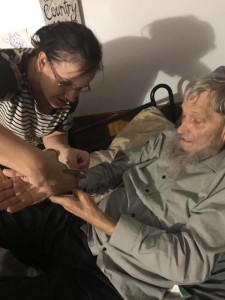
Removing the medical band after getting home from the hospital.
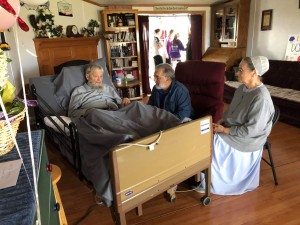
Pete and Sylvia Wagler dropped everything and came to visit.
Iva smiled calmly. The poor woman had to be exhausted. For more than two months, she had faithfully remained by Joseph’s bedside as he took the experimental blood treatments. She slept on a comfortable chair, night after night after night. Even in his subconscious mind, Joseph knew when she wasn’t in the room. He fussed inordinately when that happened. So, she stayed at his side. A long time ago, they had made a promise to each other. They would take care of each other, for better or for worse. This was worse. One can only imagine the pain of their final separation. Now, he had left. Now, at last, she could rest. Well, if you can call a funeral resting, that is.
Supper was served at 4:30. My nephew, Reuben Wagler, stood and announced the evening meal. Everyone was welcome to stay and eat. We bowed our heads as he returned thanks for the food, and for the life that his father had lived. We all meandered over to the gym, then, just across the parking lot. I was hungry for my One Meal. Supper was hot dogs and some side dishes. And cake for dessert. All the food was good, all the way through. The May’s Lick Amish community stood tall, when it came to feeding the throngs of people that showed up. That night’s offering was the simplest. The next night, there were casseroles and meat loaf and cake and ice cream. Real meat, they served it by the truckload, almost. I was certainly happy to be fed by such hosts. After supper, the evening wore on. Until around seven or so. My brother-in-law, Joe Gascho, Rosemary’s husband, stood for a short devotion and to read an evening prayer. Joe has been a preacher man for decades, up there in Aylmer. He spoke clearly, so that all could hear him in the large warehouse.
My family gathered from all over. Most of us got there that first day, Saturday. Rosemary and Joe had driven from Aylmer. Magdalena and Ray came from South Carolina. Naomi and Alvin Yutzy came from Arkansas. Jesse and Lynda from South Carolina. Rachel and Lester and Rhoda and Marvin drove in from Kansas, a long day’s journey. Stephen and Wilma came from Pennsylvania, my home stomping grounds. And Titus and Ruth arrived from Bloomfield, too, late that afternoon. Nathan would come on Sunday with our nephew Ivan Gascho and his family. We would all be together for one last time, all the children of David and Ida Mae Wagler.
That evening, there was a get-together for whoever wanted to come at a nearby Amish place. A beautiful garage shop area set up with chairs and tables. Great bags of snacks and crackers and sliced meats were served up on the tables. I was still in my eating window, so I feasted away some more. Everyone chatted and had a real good time. In the one corner, Dorothy and David and a bunch of others set up a band, with guitars and everything. Even a fiddle. And we just sang and sang and sang. A lot of old favorites. Our hearts were overflowing with gratitude and joy. So it seemed as we sang, all of our voices together.
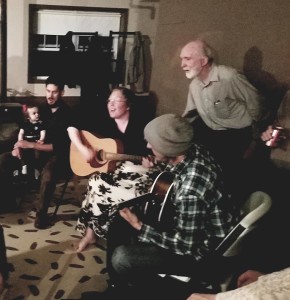
The Marners singing. Dorothy, Steven, Ray (standing).
The next morning, I joined a large crowd of friends and family in the motel lobby and dining room. The Hampton people actually set out what looked to be a real decent breakfast, and everyone was chowing down. I drank black coffee, of course, and only that. I haven’t eaten breakfast in going on two years. I mingled and talked and laughed. We were all instructed to be out at the viewing by around eleven. And we all headed out, when it was time. This day was going to be the big day, as far as seeing people and visiting with them. Tomorrow would be the funeral, and people don’t usually hang around long after. Today, and tonight, that was the time to go get caught up with anyone you wanted to.
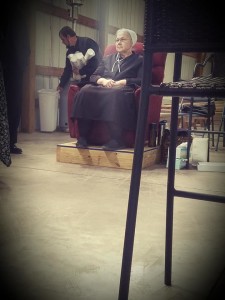
Iva Mae getting ready for the Sunday afternoon viewing.
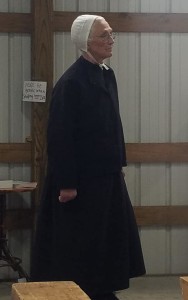
My sister Rosemary looks a lot like Mom.
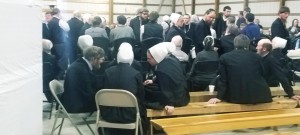
Random crowds on Sunday afternoon.
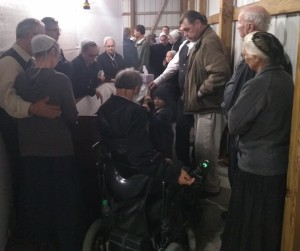
Brothers and sisters in the viewing room.
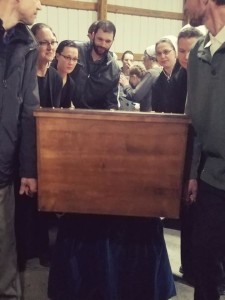
Sons and Daughters carrying their father over to the gym, where the wake will be.
A steady flow of people came filing through all afternoon. On Saturday and especially on Sunday, more than a thousand people passed through. At 4:30, we got dismissed for supper. A huge feast was laid out over at the gym. Those May’s Lick people sure know how to feed a crowd, I’ll say again. They were gracious, welcoming, and so very hospitable. I guess they had gotten to know Joseph pretty well, too, over the last ten years, when he lived here. There seemed to be a deep and quiet respect for my brother, pulsing down there, under everything that went on.
The viewing resumed after supper. Great lines formed back and forth across the width of the warehouse. I sat with my siblings on the first row back, behind the family, where the flow of traffic was directed. I shook a lot of hands and saw a good many faces that I had not seen in quite a while. And it went there, with the line, like it always does at any large viewing. People got stuck. Some people insisted on standing and visiting for way longer than was proper. I chatted furtively with a couple of Joseph’s boys. David and Glen, I think. They gave me full authority to police the line and move it along. Oh, my. Grant me power like that, and I’ll grab it every time.
So I lurked around in the center of the semicircle of chairs where the family sat. I kept an eye on things. And all too soon, the line stopped. A great gap formed between the part of the line that was moving and the part that was stuck behind someone who was talking too long. I walked up quietly, respectfully, from behind. A very slight tap on the shoulder, a muttered excuse me. And when the person turned, I told her (it was usually a woman). I’m so sorry. But you have to keep moving. Look at this gap, here. You must keep the gap filled. And people moved along better when I did that. I wasn’t mean. Just firm and respectful.
Soon after seven, the vast warehouse was filled as the youth arrived and filed in to sing. Outside, a heavy rainstorm pounded the metal roof of the warehouse. Everyone sat quietly on those endless rows of benches. They had songbooks printed up, maybe a dozen pages. Songs Joseph loved, I’m sure, and probably songs that he had picked to be sung at his funeral. The warehouse echoed with our voices, the singing was deep and stirring and beautiful. The final song was a slow tune. Lebt Friedsam, Joseph’s favorite closing song for church. Live in Peace.
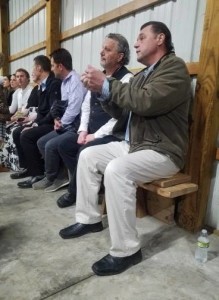
Ira and Nathan during the singing.
A great crowd of people had arrived from Bloomfield that afternoon and evening. A whole busload was traveling overnight, to get there in time for the funeral service. The Bloomfield people stepped up, I will say. Not a whole lot of them ever showed up for either my Mom’s or my Dad’s funerals. I understand. You can’t get to every funeral, and there was that awful border to deal with, getting up to Canada and back. So, this time they came by the dozens. Joseph was well known and well respected in Bloomfield, so there were a lot of connections.
That night, we gathered again at the garage on the nearby Amish place, same as before. A bigger crowd, even, than last night. And a long, long table laden with all kinds of delicious finger foods. Still in my window. I feasted again. There was much visiting and laughing. Off to one side, the band struck up again. There was much lovely singing. Later, the motel lobby was crowded with friends and family. I think I knew most everyone, all the faces. I got to bed before too late. Tomorrow was going to be a long, tough day.
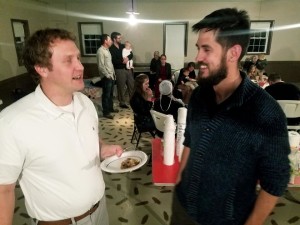
Cousins at the party. Ronald Wagler and Daniel Yutzy.
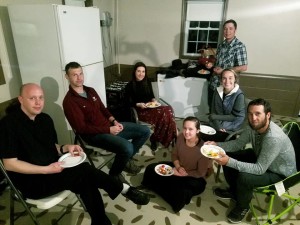
A group of cousins at the party.
The next morning, the rain came misting down as I drove my Jeep south to the community. Ahead, I saw the blinking lights on the shoulder of the highway. A buggy, and another up ahead of that one. Heading out to the funeral, they were. Somehow, the parking guy knew I was family, so I got waved to the right, up close to the big warehouse. I parked in a spot in the line of vehicles. Shrugged out of my trench coat and walked around to the front of the building. A large semicircle of bearded men stood, huddled, chatting in low voices. Oh, what the hey, I thought. I’m usually not terribly sociable in a crowd like that. That morning, I was. I walked around smiling, and offered my hand to every man. Some I recognized, then spoke their names. Others I didn’t. And I nodded and spoke my own name over and over. I am Ira. Joseph’s brother. I didn’t tell the Bloomfield people I was his brother. They already knew.
I went inside then and was shown my seat on my family row. All of us, on both sides of the aisle, with our partners, the ones who have one. I sat beside Nathan. We whispered to each other as the place filled up. Our row was directly behind Joseph’s family. All of them were seated on both sides of the coffin, which was set up in the center of things. I didn’t think everyone was going to get seated in that one big warehouse, but they did. All 850 of the people who showed up that morning. They could not have packed in many more.
And then everyone was seated. Over on the preacher bench against the wall, the first preacher stirred and then stood. Simon Wagler, who had the opening sermon at Dad’s funeral a few months back. A few weeks before, when the tests had come back and Joseph realized his time was winding down fast, he made a request. He wanted to see three childhood friends. Simon Wagler. His brother, Pete Wagler. And Alvin Graber. The second they heard about it, Pete Wagler and his wife, Sylvia, dropped everything and drove from their home in western Pennsylvania to see Joseph. He was delighted to see them. He talked and talked, they visited and visited. When Pete and Sylvia left later that day, they didn’t know it, but they were pretty much the last people outside Joseph’s immediate family who saw him as lucid as he was. That relaxed. That conscious. Simon and his wife Susie traveled in a few days later to see him. He was still with it enough to talk. Simon stood by my brother’s bedside and read comforting Psalms aloud. At some point in there, Joseph asked Simon then if he would preach at his funeral. Simon agreed that he would.
And now he stood, speaking in his loud clear voice. Fifteen minutes or so. And then another man stood to speak. I didn’t know him, but was told. It was James Mast, Joseph’s neighbor and co-minister. His son, Josh, married Joseph’s daughter, Laura. So he certainly had a connection. He spoke clearly, too. Fifteen minutes or so, then he sat down. And then the local bishop, Tim Coblentz, stood to preach the main part.
I had heard Tim before. He was the main speaker at Mom’s funeral, way back in 2014. He obviously knew my brother well, and he spoke with compassion and deep feeling. Bishop Tim comes from Milroy, Indiana, and he knows what loss is. His teenage daughter was killed in a buggy accident on the road, years ago. Ironically, and tragically, Tim Coblentz was diagnosed recently with the very disease that killed Joseph. Multiple myeloma. He has gone through some serious treatments, you could see his hair was short and freshly regrown from whatever it was that made it fall out. He spoke his most memorable line as he was winding down. Talking about Joseph and his suffering, Tim proclaimed. “On Friday morning at four o’clock, Joe Wagler was cancer-free.”
Tim sat down in good time, too. And then the crowds filed through, directed by the ushers. Men and women and youth and young children of every stripe, from many communities. And then Joseph’s children came up with their families, two families at a time. I won’t pretend to know the names of all the grandchildren. All thirty-seven of them were there. From oldest to youngest, the families came. John and Dorothy Wagler from Bloomfield. Rachel Irene and Lester Beechy, Amish from Bloomfield. David Ray and Barbara Wagler from Kokomo, Indiana. Reuben and Barbara Ann Wagler from Jamesport, Missouri. Mervin and Marlene Wagler from upstate New York. Glen and Leann Wagler from Kokomo. Mary Ann and Jason Stutzman from Worthington, Indiana. Laura Mae and Joshua Mast from May’s Lick. Rosanna and Joshua Shannon from May’s Lick. And Samuel and his girlfriend, Keila, from Kokomo.
They came up, family by family, and the little grandchildren wept with their parents. This, then, was part of my brother’s legacy. Little children crying because they loved him and were heartbroken that he was gone. After all the family had passed through, it was our turn. Joseph’s brothers and sisters. We got up and walked to the coffin. Huddled around as a group. It was the last time on this earth that all eleven of us children would be together on the same spot. It would never happen again in this life. We stood, we held each other, we felt and absorbed, we shed some tears. After a few minutes, we turned and walked back to our seats.
On both sides of the center, where the coffin was, the extended Freundschaft stayed standing. This was planned, and provided a shield for Iva and all her children to surround Joseph one more time. They stood and looked down on his face, just the immediate family. The memories flooded in unbidden, and the tears flowed again. So much pain, so much suffering, and now, at last, peace in death. Then the family was seated again. The Amish funeral director stepped up. He closed the lid and turned in the screws tight and hard. This was it. There would be no viewing at the graveyard.
Joseph’s six sons carried him outside and set the box onto an open hack buggy parked there. The box was strapped in, and the buggies lined up. Nathan joined me in my Jeep as we edged into line. And the buggies slowly started out, and turned right onto the road. I was amazed to see two local cop cars waiting. One led the procession, and one brought up the rear, lights flashing. A mile or so down the winding road, then right onto a side road. The cop cars left us when we turned off the main road.
At the graveyard, a large hole had been dug by hand the day before. The Kentucky clay was hard shale, not soft and sandy like the Aylmer dirt where we buried Dad a few months ago. It went quick. No viewing outside. They had the coffin ready to be lowered by the time Nathan and I walked up. A large tent had been set up to keep out the elements. It never rained into the open grave.
The pallbearers adjusted their straps. And down, down went the coffin, into the rough wooden box that had been framed and fitted at the bottom of the hole. It fit perfectly. Then up came the straps. And down went the lid onto the rough box. And the dirt was shoveled by hand until a layer covered the top. Then the family stepped in to help. Sons, daughters, grandkids with their cute little shovels, all of them came and helped to cover the patriarch of their clan. We stepped up too, his siblings, and formally shoveled the hard chunky clay into the hole. After some time, the family was done. The pallbearers stepped up, then, and piled the dirt high.
A few things happened, then, that probably don’t often happen at an Amish funeral. The family passed out dozens of red roses. The children and grandchildren walked up and stooped and placed the long-stemmed roses on top of the pile of dirt. We all did it, too, the extended family, Joseph’s siblings. After the roses, dozens of balloons were handed out to those still standing around. We stepped outside the tent, and someone led the countdown from ten. The balloons were released. They lifted higher and higher into the skies, then disappeared.
There was one more thing to do there at the graveside. Joseph’s grandchildren had a fond nickname for their grandfather. Ice Cream Daudy. Ice Cream Grandpa. He loved to be called that. Iva Mae was called Popsicle Mommy. And now, someone brought out boxes and boxes of drumstick ice cream cones, the wrapped ones. And right then, I decided. Today, I would move my meal up, to eat here. I happily took an ice cream drumstick, ripped it open, and munched away. Nathan had snuck back with someone else. I drove my Jeep to the schoolhouse and gym, where a great noon meal had been prepared. Again, the May’s Lick Amish community did a fantastic job in feeding the teeming multitudes. They even had special food, fried chicken and fixings, for all the immediate family. By the time I discovered there was special food, I had already eaten. Everything they served was just delicious.
I mingled and visited as the afternoon slipped by. At a funeral like this, people start drifting away as soon as they’re able to. After the meal is a good time for that. I chatted with old friends and many strangers. By four or so, I was heading back to the motel to rest a bit. Tomorrow morning, first thing, I would head for home. And back to normal life. I guess there is such a thing as normal life, these days. You wonder, sometimes, in the thick of things.
I remember the last time I spoke to Joseph, there at The James, in Columbus. Ohio State got a real classy place, there, much as I despise their football team. Joseph’s sons and daughters took turns, coming to stay with him. It got exhausting. And so the word went out to extended family. Come if you can, to take a turn. I went that weekend in early February. My sisters, Naomi and Rachel, had come, too, to help out. Our good friends, John and Lydia Schmid, drove over from their home in Holmes County that Sunday morning. We had a short service in the room. John led us in songs, strumming his guitar. Joseph’s son, Reuben, stood and spoke a short devotional. And we talked and sang some more. By late morning, I was making noises to head for home.
I walked around the room, shaking hands and hugging good-bye. And at the end, I stood by my brother’s bed. He smiled at me, his face etched with weariness from all the pain and suffering he had endured on the long journey to this moment. It was a real smile, and he spoke cheerfully. “I’m going home soon, Ira,” he told me. “Whether it’s this home, or the one over there, I guess it doesn’t really matter.” No, I said. It doesn’t really matter. You don’t have to be afraid. I held his hand briefly, then turned and walked out the door. In my heart, I knew that I’d never see my brother alive on this earth again. And that’s how it turned out.
And now, it was over. We had buried one of our own, one of our family. And I thought about it. For more than forty years, Joseph had labored tirelessly in the vineyards of the Lord, proclaiming the good news of the gospel. Now, the Lord had called his faithful servant home.
Joseph Wagler. The first of my siblings to cross the great divide. Sleep now in your dark new house, where the winds are always silent. You lived well. And you loved well in a broken world. May your legacy of freedom pass from generation to generation until the end of time. Until we meet again, rest in peace, my brother.
Share


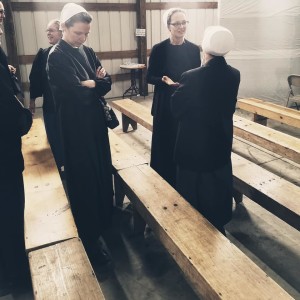
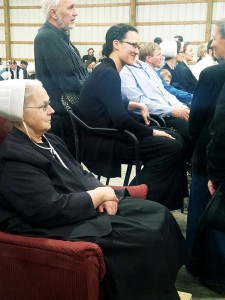
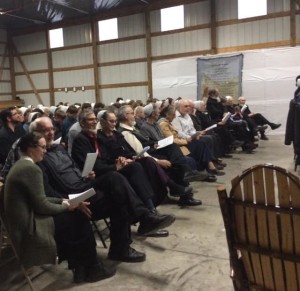
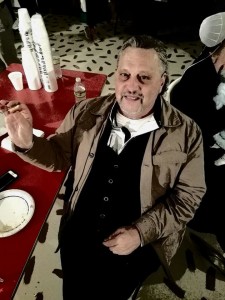
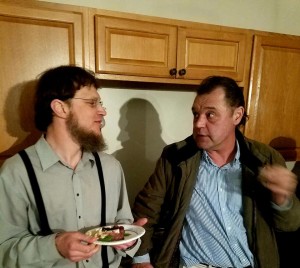
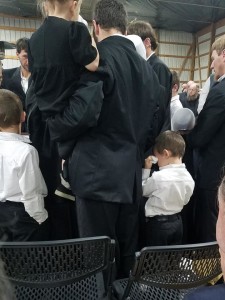
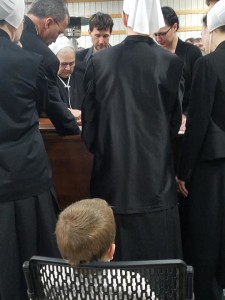
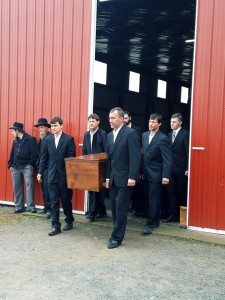
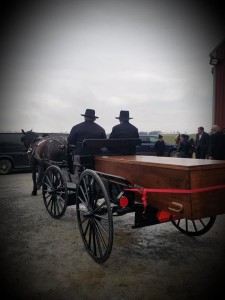
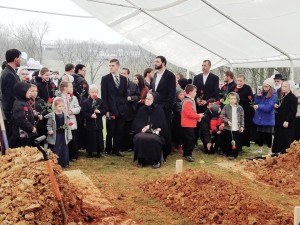
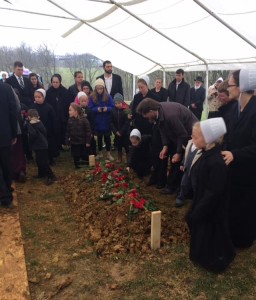
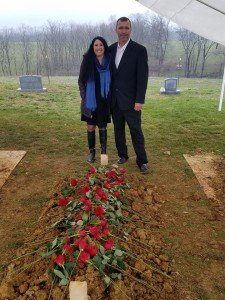
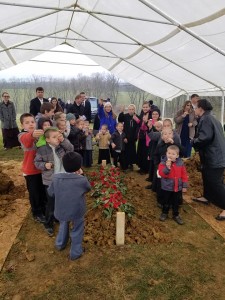
Every word seemed to speak to me as a dearly beloved Aunt of mine is facing her last days and we face a road trip for another funeral. Reading of The James takes me back, having spent some time there myself. I empathized with Joseph because it is strange to be at a CANCER hospital. I recall looking around at other couples wondering which one was the patient and what kind they had.
I appreciated your powerful words against religions that divide families. Your brother’s life full of sunshine and shadow (like all of ours) was displayed with dignity and honor. This is another well written masterpiece. I felt like I was there. May God bless each of the family members as healing begins.
Comment by Janet Bell — April 5, 2019 @ 7:18 pm
Sincere condolences Ira and family. Beautiful blog honoring your brother Joseph.
Comment by Marion Riley — April 5, 2019 @ 9:00 pm
I had hoped to meet Joseph again sometime but waited too long. I have a cousin not far from where Joseph’s lived; they had travelled to Canada together but we did not meet them. I thought perhaps we would visit my cousin and then meet your brother as well. We first met just over 50 years ago at your parent’s home in Aylmer.
Comment by OSIAH HORST — April 5, 2019 @ 9:01 pm
Blessings and sweet memories to the whole family.
Comment by Sho — April 5, 2019 @ 9:19 pm
Ira, Thank you for your very special blog honoring your brother. I wish to give my condolences at your loss. My brother is in hospice care waiting to be called to his heavenly home. He had gotten a brain tumor 2 yrs ago that couldn’t be operated on because of where it was. After all the chemo and radiation and what all was involved he still hung on with a thread. Now it seems it will soon be over. He is the first one of us 4 siblings to cross over into the next world. I am awaiting the phone call to say it is time.
I live in Europe and I have to arrange a plane ticket. I can’t wait to go “home” but when I do it means my brother will be gone. My brother is a quiet, humble, man who is highly appreciated in the church world as well as the community. Saying good-bye to a sibling won’t be easy. This brother and I were able to be beside our father exactly 20 yrs ago when he passed away. My father had the same kind of blood disease that your brother Joseph had. Thanks again for your special blog. May the Lord be with you too as your give Joseph’s life and passing a place in your life.
Greetings from Mary Maarsen
Comment by mary e maarsen — April 6, 2019 @ 6:55 am
Prayers to you and your family. Your words are a loving tribute. I’m sorry you and your family have had so much recent loss.
Comment by Erin — April 6, 2019 @ 7:22 am
I can’t even see clearly and my eye liner is all over my cheeks.
Your imagery is always so spot on, that it takes us, the readers, there with you, to all the places and events and happenings, you write of, Ira. From your black coffee moments at Sheetz, to visits with Amish friends, 😉 to stirring and emotional travels back ‘home’ to see your dad…and then again that last time in December…to this most recent time of sorrow.
When I read the part about Tim…well, that even brought forth an audible sob. Damn you MM….Did you know that March was/is Multiple Myeloma Awareness month?
I must go wash my face now…
God Bless you, my friend. Oh and I loved how you changed it up a bit for the Drumstick…for your brother.
Comment by Cathy C. — April 6, 2019 @ 9:10 am
All was nicely written and I was held on to every word. Thank you for bringing us into the touching moments for you and your family. I tend to forget that we are all leaving this earth, and all have our story and none of us gets to stay forever until I lose a family member or friend; yet none of us are prepared. This is a nice story as in books there’s always that one chapter that stands out, as was this.
Comment by carol ellmore — April 6, 2019 @ 2:40 pm
Great writing and so interesting. I met Joseph once down In Pinecraft. My cousin there had a Hochstetler get together for all relatives that were in Florida. Iva’s father Monroe, was my first cousin.
Preacher James Mast, that you mentioned, is my nephew. My oldest sister Katie’s son.
Comment by Sarah Ayers — April 6, 2019 @ 3:04 pm
Thank you for sharing this lovely tribute of your brother! In all his humanness he made mistakes but the powerful message here is that he did his best to correct the mistakes & to show his love to his children.
Comment by Angie — April 6, 2019 @ 4:51 pm
This moving and loving tribute reminds me why I follow your work, Ira. Thank you for sharing it with us.
Comment by Cara S ODonnell — April 6, 2019 @ 5:07 pm
Good morning IRA, I’m so sorry to hear about your brother. I can only imagine his pain. My brother in law has leukemia. It’s also a disease in the blood. Although he endures pain as well, he has alot of good days too. And he’s much younger. I can’t imagine my sister being a widow. Everyday we are grateful to have him still here with us. As I was reading your blog, I envisioned how this day could be for my sister. Thanks for sharing. Praying for you, your family.
Your Friend,
Mary Elliott
Comment by Mary Elliott — April 7, 2019 @ 11:38 am
What a loving tribute to your brother.
Comment by Forsythia — April 7, 2019 @ 4:20 pm
What a wonderful tribute to your brother! I’m sure his “frienschaft” will treasure this writing for generations to come.
Comment by Rosita — April 7, 2019 @ 4:46 pm
Outstanding tribute to your brother and making us feel as if we were physically at the celebration of his life! As usual, this blog was thought provoking and deep. Thank you for sharing. Thoughts and prayers to you and your wonderful family!
Comment by Debra Davis — April 7, 2019 @ 7:50 pm
I’m not fond of being a fan to anybody even being a fan to Hollywood actors but since I cannot find a right term, I think this is the closest that I could use. I became one of your fans since reading your book which I found in a Goodwill store so I bought it cheap. But once I started reading it, it was hard to put it down. An excellent book indeed that I hope everyone should read it, including my 4 kids, but they didn’t yet. Since then, I began to read some of your blogs once in a while. You’re an excellent writer!
Comment by Dina L. — April 9, 2019 @ 1:19 pm
So sorry for your losses.
Comment by Carl Clink — April 10, 2019 @ 9:56 am
I love reading your blog and following your life story. I read approx. 20 books a month but when I read “Growing Up Amish, ” it was by far the best book I ever read as it was so well written where I could feel your pain and anguish, and I didn’t know until the end what you would decide to do. My son rarely reads but I made him read it and he agreed it was a great book.
Comment by Sally Underwood — April 11, 2019 @ 5:43 pm
My condolences to you on the passing of your brother. That is a hard thing, any way you write it. There is nothing like a Amish funeral with its traditional ceremony to help bring closure to the family. We put my mom in the ground back in 1994. She was the glue that kept us all put together. The family is certainly not as tight now as it was back then. And part of the reason for that is those of us scattered across the country have less reason to go home. I know I don’t. That’s just the way it is…Peace to all….
Comment by Lenny — April 17, 2019 @ 1:05 pm
I had a lovely visit with Joseph and your father David when they were spending time during the winter season in Pinecraft. They both chuckled when I mentioned how you wrote so eloquently and descriptively about the telltale sounds of your dad clacking away on his typewriter late at night.
Comment by Ruth Weisberg — May 3, 2019 @ 5:02 pm